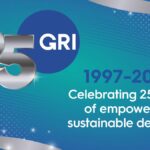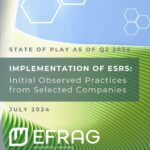
A delve into the early years – with Folkert van der Molen
With GRI’s 25th anniversary milestone reached in September, we continue the look back on the journey that has led to where we are today. An important stage was a decision to set up a permanent secretariat in The Netherlands, five years after the organization was founded in Boston, USA.
To give some unique insights to this part of the story, and reflect on the growth of sustainability reporting over the past quarter of a century, we put a few questions to sustainability entrepreneur Folkert van der Molen – a long-term GRI supporter and a pillar of the Dutch CSR community.
I know your relationship with GRI goes back a long way. How did you first become involved in sustainability reporting?
“Well, in the mid ‘90s I worked for what is now PwC, in the environmental consultancy department, and then in environmental marketing for engineering firm DHV. At that time, it was just starting to become more common for large companies to provide environmental reporting, an area that I was really interested in.
With the internet still emerging, publishing environmental reports online was still a new trend, and there was no one portal to accommodate this. That led to me starting in 1997 what is now www.sustainability-reports.com, as a location to share news, guidelines and developments, and of course publish reports.
Around this time in The Netherlands, a law was introduced that meant the 250 largest polluters had to provide environmental data to the national government – and make it publicly available. Yet with no guidance on exactly what to report, companies provided different information in different ways, and that became a problem.”
What are your earliest memories of GRI, and how did you become involved with GRI’s move to Amsterdam?
“I knew the person at the Dutch government who was leading the implementation of the new environmental data law. I asked him if he aware that environmental reporting was evolving into something wider, and that a new body called Global Reporting Initiative had just been established.
The result was that I was supported to travel to the USA to find out more, and meet with GRI (around 1997-1999). That’s how I become involved as an early supporter. And when GRI published its first draft guidelines for sustainability reporting in 1999, I organized the translation into Dutch. I think this will have been the first language other than English that the guidance was available in.
In 2001, GRI was exploring opportunities to move from the US and be headquartered in Europe. Given its central location and the main international companies and organizations based here, I proposed that the Netherlands could be GRI’s future home. I helped set up a meeting between GRI’s CEO [Allen White] and officials in the national government – which ultimately led to a decision for GRI to relocate to Amsterdam the next year.”
How has sustainability reporting changed over the past 25 years – both in the Netherlands and around the world?
“I think some of the major changes I have seen is the move towards integrated reporting, more standardization in reporting approaches, and higher quality data. And of course, the sheer number of reports has increased a lot! Many, many more companies produce a sustainability report than was the case 25 years ago.
More recently, there has been the trend towards mandatory reporting requirements, such as in Europe with the CSRD [Corporate Sustainability Reporting Directive], which is going to drive up the number of reporting companies. For example, I recently read an article that said it was initially thought 500 companies in The Netherlands will fall under the CSRD reporting rules. Now they think it will apply to as many as 3,500-7,000 Dutch businesses. That’s a huge amount of companies, with some reporting for the first time.
Companies are struggling to find sustainability reporting consultants and experts to help them to prepare. Recruitment of people with the right skills and experience is already an issue.
The whole sustainability market right now is booming. For my Dutch CSR portal, I used to receive suggestions for 10 interesting news stories in a week. Now I have 10 options in my inbox, in a matter of hours!”
What are your hopes for the future of sustainability reporting, and what are the challenges?
“My hope is that sustainability data will, in time, be regarded as at least as important as financial information. In fact, some already do not like classifying sustainability data as ‘non-financial information’. Instead there’s a movement to term it ‘pre-financial information’. This is because, in the long-term, reporting on impacts can become financially material, depending where you draw the line.
Looking ahead, the quality and reliability of sustainability information will be more important than ever – with organizations increasingly held accountable for the accuracy of what they report. The social license of a company to operate will depend on it.”
For more on GRI’s beginnings, read the publication 25 Years as the Catalyst for a Sustainable Future.
This interview was published on GRI’s website



